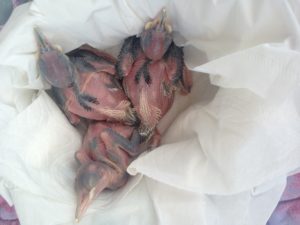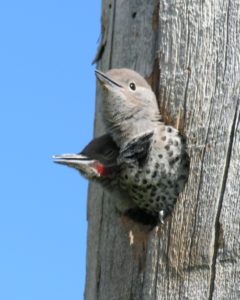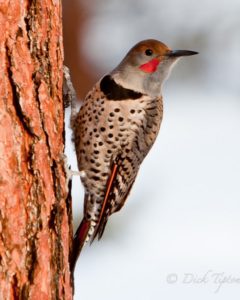California Arborist becomes benefactor to orphaned woodpeckers

Today the flickers are starting to show feathers
It is rare that the Cavity Conservation Initiative’s phone rings at 7:38am. Don Swartzbaugh was on the line. He is the owner of California Arborist in Whittier. Don had just received our letter informing him about the three woodpeckers that his crew had accidentally evicted out of their nest cavity while working in a neighborhood in Hacienda Heights. The birds are now identified as Northern Flickers, a species that has been in decline in parts of their range. The Songbird Care and Education Center in Huntington Beach is currently caring for them.

Young flickers viewing the world for the first time
Before calling us, Don had already been to our website to read our report and see the photos of the birds that had been rescued by good Samaritan, Anthony Padilla, who transported them to the center. And Don had already been to his company’s backlot to examine the wood remains from that recent job site. He was unable to find the woodpecker’s nest cavity. Uncertainty therefore lingers as to just which tree the birds had occupied and how this accident happened, but Don made no attempt to suggest that his crew was not responsible. He wanted to convey that his company tries to protect nesting birds when trees are managed. Within an hour, both the Songbird Care and Education Center and the Cavity Conservation Initiative had received a generous donation from his company. In this way, California Arborist will be supporting the birds they orphaned.
The flickers are expected to need care for six weeks. Assuming they make it till then, they will be released into the wild. It’s a labor intensive and costly business. Please consider making a donation to the Songbird Care and Education Center to support these and many other injured and abandoned birds. http://songbirdcareandeducation.org
Enjoy this photo of an adult Northern Flicker by Dick Tipton. Flickers perform important ecological benefits by consuming thousands of ants and other insect daily and by excavating nest sites that other birds later use to raise their families.

Adult Northern Flicker by Dick Tipton


Connect
Connect with us on the following social media platforms.